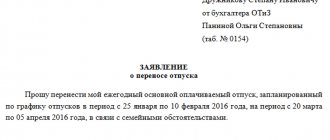Vacations never expire
The Constitutional Court of the Russian Federation considered the complaint of four citizens who were not paid compensation for unused vacations.
Employers indicated that the maximum period for payment of compensation is 18 months. These one and a half years are counted from the end of the year for which the full-time employee was entitled to leave. The fact is that the ILO Convention on Paid Holidays states that the remainder of the leave should be used no later than the specified period.
The courts supported this position, adding another three months to the appeal period.
Thus, the judges concluded, if 21 months have passed since the end of the specified year, then the employee loses the right to receive monetary compensation.
Based on this position, one of the citizens who applied, for example, was denied compensation for vacation that he did not take for fifteen years: from 1997 to 2012. For the other three applicants, the situations were similar, although not as extensive.
The Constitutional Court of the Russian Federation decided that this approach is erroneous. Although not all courts in our country adhere to it. Others think completely differently. They're right, and here's why.
The 18 months mentioned above is the maximum period for using vacation during the employment relationship. But the data for a year and a half is not limited in any way by the regulated Art. 127 of the Labor Code of the Russian Federation, the scope of the dismissed employee’s right to vacation pay for unused legal rest time.
Upon dismissal, compensation must be paid for all vacations that were not taken by the employee during his employment with the company. In other words, the time that has passed since the year for which the leave was granted does not matter.
Moreover, since October 2016, the period for going to court to recover such compensation is not three months, as before, but a year, which is counted from the moment of dismissal.
The Constitutional Court of the Russian Federation ordered that the cases of citizens be reviewed and prohibited anyone from giving a different interpretation to the described issue and trying to apply it in practice.
Resolution of the Constitutional Court of the Russian Federation dated October 25, 2018 No. 38-P “In the case of verifying the constitutionality of part one of Article 127 and part one of Article 392 of the Labor Code of the Russian Federation in connection with complaints from citizens M.V. Danilova, K.V. Kondakov and others"
Article 126. Replacement of annual paid leave with monetary compensation
(as amended by Federal Law No. 90-FZ of June 30, 2006)
Part of the annual paid leave exceeding 28 calendar days, upon written application of the employee, can be replaced by monetary compensation.
When summing up annual paid leave or transferring annual paid leave to the next working year, monetary compensation can be replaced by a part of each annual paid leave exceeding 28 calendar days, or any number of days from this part.
It is not allowed to replace with monetary compensation annual basic paid leave and annual additional paid leave for pregnant women and employees under the age of eighteen, as well as annual additional paid leave for employees engaged in work with harmful and (or) dangerous working conditions, for work in appropriate conditions (with the exception of payment of monetary compensation for unused vacation upon dismissal).
You cannot go on vacation without permission during the May holidays.
The employee wrote an application for leave from May 10 to May 12, 2022 and went on vacation. However, according to the vacation schedule in 2022, he was entitled to annual paid leave from May 15 to 28, as well as from November 13 to 26. Thus, going on vacation on May 10–12 was arbitrary. In this regard, the company issued an order to dismiss him for absenteeism (clause “a”, clause 6, part 1, article 81 of the Labor Code of the Russian Federation).
The court where the employee appealed only supported the organization.
The employee was explained that, in accordance with Art. 123 of the Labor Code of the Russian Federation, the vacation schedule is mandatory for both the employer and the employee. Therefore, you need to go on vacation during the periods indicated in it.
Having written an application for leave on other dates, the employee had no reason to believe that such leave was granted to him. It was necessary to ensure that a leave order had been issued. No order about this was issued.
Thus, the employer had grounds to regard the plaintiff’s absence from work on May 10, 11 and 12, 2022 as a gross violation of labor discipline - absenteeism, and to apply disciplinary action to him for this offense in the form of dismissal on appropriate grounds.
Appeal Ruling of the Moscow City Court dated 02/08/2018 No. 33-1730/2018
Editor's note:
In fact, taking a vacation in May is extremely unprofitable. The fact is that due to holidays there are much fewer working days this month. Therefore, the cost of one working day in May is higher than in those months in which there are no holidays. Consequently, the more working days of May an employee took as vacation, the less salary he will receive compared to the salary he would have received if he had rested these days in another full-time working month, say, in July.
Example.
The employee has a salary of 50 thousand rubles. This means the cost of a vacation day (if he worked the entire pay period): 50 thousand rubles. x 12 months / 12 months x 29.3 = 1,706.48 rubles.
In May 2022 there are 18 working days, that is, the cost of 1 working day = 2,777.77 rubles, and, for example, in August 2022 there are 22 working days, that is, the cost of 1 working day = 2,272.72 rubles. It turns out that if you go on vacation in May and not in August, the difference between the cost of a working day and a vacation day will be noticeable, in other words, the employee will lose more money.
In this way, you can compare the entire year by calculating the cost of working days and comparing them with the cost of a vacation day.
TABLE: “Comparison of monetary losses when going on vacation in different months”
| Months of 2019 | Number of working days | Salary amount | Price working day | Vacation day cost | The difference, that is, the amount of loss per day |
| January | 17 | 50 000 | 2 941,17 | 1 706,48 | 1 234,69 |
| February | 20 | 50 000 | 2 500,00 | 1 706,48 | 793,52 |
| March | 20 | 50 000 | 2 500,00 | 1 706,48 | 793,52 |
| April | 22 | 50 000 | 2 272,72 | 1 706,48 | 566,24 |
| May | 18 | 50 000 | 2 777,77 | 1 706,48 | 1 071,29 |
| June | 19 | 50 000 | 2 631,57 | 1 706,48 | 925,09 |
| July | 23 | 50 000 | 2 173,91 | 1 706,48 | 467,43 |
| August | 22 | 50 000 | 2 272,72 | 1 706,48 | 566,24 |
| September | 21 | 50 000 | 2 380,95 | 1 706,48 | 674,47 |
| October | 23 | 50 000 | 2 173,91 | 1 706,48 | 467,43 |
| November | 20 | 50 000 | 2 500,00 | 1 706,48 | 793,52 |
| December | 22 | 50 000 | 2 272,72 | 1 706,48 | 566,24 |
Conclusion: in 2022, it is most expensive to go on vacation in January and May, and the most profitable time off will be in July and October.
What documents are needed directly to apply for a vacation?
In order to send an employee to rest and pay him vacation pay, an order and a note-calculation for the provision of vacation are drawn up. These documents have standardized forms (but you can use your own):
- For the order, this is form T-6. You will find a sample and comments on how to fill it out here.
- For a note-calculation - form T-60. Read about this document here.
The period of the next vacation must be noted on the working time sheet. For this, the alphabetic code “OT” or the numeric “09” are used. Also, a note about the vacation must be made in the employee’s personal card.
The Ministry of Labor of the Russian Federation prohibited employers from providing vacations on weekends
Officials believe that providing vacations starting from Saturday or Sunday does not contradict the norms of the Labor Code of the Russian Federation. But if an employee’s vacation falls exclusively on weekends, then the company will face an administrative fine of 50 thousand rubles.
Letter of the Ministry of Labor of the Russian Federation dated December 7, 2018 No. 14-2/OOG-9754
Editor's note:
One can argue with the position of the Ministry of Labor of the Russian Federation. The fact is that the code allows you to split your vacation into parts. The main thing is that one of them is at least two weeks old. Workers have the right to take the remaining days as they wish.
According to the Labor Code of the Russian Federation, vacation is given in calendar days. In this regard, a citizen can use it on weekends.
Let us note that workers do not take vacations in this way because they have a good life. Thus, they receive vacation payments for the weekend, depriving themselves of rest days.
Article 125. Division of annual paid leave into parts. Review from vacation
By agreement between the employee and the employer, annual paid leave can be divided into parts. Moreover, at least one part of this leave must be at least 14 calendar days.
Recall of an employee from vacation is permitted only with his consent. The part of the vacation unused in this regard must be provided at the employee’s choice at a time convenient for him during the current working year or added to the vacation for the next working year.
Employees under the age of eighteen, pregnant women and employees engaged in work with harmful and (or) dangerous working conditions are not allowed to be recalled from vacation.
Ministry of Labor: how to provide leave to employees with many children
Thanks to the amendments introduced by Federal Law No. 360-FZ of October 11, 2018 to the Labor Code of the Russian Federation, parents with many children have the opportunity to go on vacation at any time convenient for them. Condition: having three or more children under 12 years of age.
However, the code does not establish a special procedure for granting leave for this category. Therefore, in addition to preferences in the order of vacations, parents with many children go on vacation like everyone else. That is, the right to vacation appears to employees who have been working in the company for at least 6 months. However, by agreement with the employer, they can go on vacation earlier than the established period.
Letter of the Ministry of Labor of the Russian Federation dated November 20, 2018 No. 14-2/OOG-9211
Editor's note:
The age of children is calculated based on the year of leave granted (Letter of the Ministry of Labor of the Russian Federation dated November 20, 2018 No. 14-2/OOG-9166).
Article 119. Annual additional paid leave for employees with irregular working hours
Employees with irregular working hours are provided with annual additional paid leave, the duration of which is determined by a collective agreement or internal labor regulations and which cannot be less than three calendar days.
(as amended by Federal Law No. 90-FZ of June 30, 2006)
The procedure and conditions for granting annual additional paid leave to employees with irregular working hours in organizations financed from the federal budget are established by the Government of the Russian Federation, in organizations financed from the budget of a constituent entity of the Russian Federation - by the authorities of the constituent entity of the Russian Federation, and in organizations financed from local budget - local government bodies.
The Ministry of Labor of the Russian Federation explained in what cases annual leave is not required
The Labor Code of the Russian Federation allows a woman to go on maternity leave for up to three years. This right can also be exercised by the child’s father, grandmother, grandfather, and other relatives who care for the child. During this time, the employee or her relatives caring for the baby have the right to go to work or work at home on a part-time basis.
Workers who work according to this schedule are subject to all labor laws. That is, they can, like other employees, go on annual paid leave. The number of vacation days does not depend on the time worked per year. This means that if a citizen worked for a year on a part-time schedule, then he has the right to rest for all the required 28 calendar days. Therefore, if an employee combined child care with work, then this period will be included in the length of service giving the right to basic paid leave.
However, the Ministry of Labor of the Russian Federation warns that the provision of two labor holidays at the same time is not provided. Thus, in order to take advantage of annual leave, children's leave must be interrupted. By the way, it can be resumed later.
Letter of the Ministry of Labor of the Russian Federation dated October 25, 2018 No. 14-2/OOG-8519
Editor's note:
Let us note that the court allows interruption of “children’s” leave for the sake of annual leave (Resolution of the Arbitration Court of the Far Eastern District dated November 27, 2018 No. F03-4742/2018). The Federal Social Insurance Fund of the Russian Federation refused to offset the child care benefits paid to the employee. The inspectors were dissatisfied with the upward recalculation of benefits, the reason for which was the specialist’s annual paid leave, for which the main “children’s” leave was interrupted for 6 days.
However, from the first verdict in the case, the courts sided with the company, and the legality of such a suspension of parental leave was confirmed in Resolution of the Plenum of the Armed Forces of the Russian Federation dated January 28, 2014 No. 1.
The fund's arguments that this position is correct only for part-time workers were rejected by the district cassation, emphasizing the universal nature of the clarifications of the RF Armed Forces.
Article 124. Extension or postponement of annual paid leave
Annual paid leave must be extended or postponed to another period determined by the employer taking into account the wishes of the employee in the following cases:
(as amended by Federal Law No. 90-FZ of June 30, 2006)
temporary disability of the employee;
the employee performs state duties during his annual paid leave, if the labor legislation provides for exemption from work for this purpose;
(as amended by Federal Law No. 90-FZ of June 30, 2006)
in other cases provided for by labor legislation and local regulations.
(as amended by Federal Law No. 90-FZ of June 30, 2006)
If the employee was not paid in a timely manner for the period of annual paid leave or the employee was warned about the start time of this leave later than two weeks before its start, then the employer, upon the written application of the employee, is obliged to postpone the annual paid leave to another date agreed with the employee.
(Part two as amended by Federal Law No. 90-FZ of June 30, 2006)
In exceptional cases, when the provision of leave to an employee in the current working year may adversely affect the normal course of work of an organization or individual entrepreneur, it is allowed, with the consent of the employee, to transfer the leave to the next working year. In this case, the leave must be used no later than 12 months after the end of the working year for which it is granted.
(as amended by Federal Law No. 90-FZ of June 30, 2006)
It is prohibited to fail to provide annual paid leave for two years in a row, as well as to not provide annual paid leave to employees under the age of eighteen and employees engaged in work with harmful and (or) dangerous working conditions.
A child’s illness is not a reason to extend a parent’s vacation
If an employee falls ill during his vacation, then it should be extended or the rest days transferred to another time (by agreement with the employee). However, if the illness overtakes the child, then the parent’s leave is not extended, because such a right is not enshrined in the Labor Code of the Russian Federation.
However, due to its financial capabilities, the employer has the right to extend vacation in such a situation, if this is enshrined in a local act.
Editor's note:
Similar conclusions are contained in the Letter of Rostrud dated 06/01/2012 No. PG/4629-6-1.
When do you need to pay vacation pay to avoid being fined?
The Labor Code of the Russian Federation requires payment for vacation three days before it starts. The employer does not have the right to adjust this period downward. Moreover, this is a minimum period of time. Therefore, money can be issued even earlier.
The majority of workers go on vacation on Monday. Employers are wondering: when in this case should they pay their employees?
According to the Ministry of Labor of the Russian Federation, the deadline for issuing vacation pay here is Thursday of the previous week.
Letter of the Ministry of Labor of the Russian Federation dated September 05, 2018 No. 14-1/OOG-7157
Editor's note:
If the employer delays the payment of vacation pay, he faces administrative liability under Art. 5.27 Code of Administrative Offenses of the Russian Federation. Please note: the absence of the employer’s fault in violating the deadline for paying vacation pay does not relieve him of this responsibility, since there are no exceptions to the rules provided for in Part 9 of Art. 136 of the Labor Code of the Russian Federation (Letter of the Ministry of Labor of the Russian Federation dated August 26, 2015 No. 14-2/B-644). Let’s say an employee, due to family reasons (for example, a close relative is sick), asks to be given paid leave for several days starting tomorrow. The employer does not object; the accountant calculates and pays him vacation pay on the day on which the application is dated. In this case, the company violates the rule on payment of vacation pay three days before the start of the vacation, established by Art. 136 Labor Code of the Russian Federation. After all, this norm is imperative and has no exceptions. Therefore, in this case, a fine may be imposed on the employer under paragraph 1 of Art. 5.27 Code of Administrative Offenses of the Russian Federation - from 30 to 50 thousand rubles.
Let us note that a number of judges support this position of the department (Resolution of the Perm Regional Court dated March 15, 2018 No. 44a-318/2018, rulings of the Chelyabinsk Regional Court dated September 17, 2015 No. 11-11043/2015, Rostov Regional Court dated September 16, 2013 No. 33- 11864).
What bonuses are included in the calculation of average earnings when calculating vacation pay?
Question. What bonuses are included in the calculation of average earnings for calculating vacation pay? Over the past year, our organization paid: a bonus based on work results for 6 months (payment in July 2022) and a bonus based on work results for the year (payment in January 2019). Also, some employees were paid a bonus based on the results of their work for the month.
Answer. When calculating average earnings, various types of bonuses can be taken into account. To do this, they must be provided for by the organization’s remuneration system, fall within the appropriate billing period (with the exception of the annual bonus, which is taken into account regardless of the accrual period), and must also be taken into account once on each basis (or for one indicator).
As is known, to pay for the period while on vacation, amounts are taken from the calculation of average earnings, the general procedure for calculating which is contained in Art. 139 Labor Code of the Russian Federation. In accordance with this article, to calculate the average salary, all types of payments provided for by the remuneration system and applied by the relevant employer are taken into account, regardless of the sources of these payments.
Similar provisions are contained in Decree of the Government of the Russian Federation dated December 24, 2007 No. 922. In paragraphs. “n” clause 2 indicates the need to include in the calculation bonuses and remunerations provided for by the remuneration system.
These standards establish the main criterion for answering the question of whether certain types of bonus payments should be included in the calculation of average earnings. That is, in order to account for bonuses, they must initially be provided for in labor, collective agreements or the organization’s local regulatory act on bonuses. In other words, payments must be provided for by the current wage system.
The second important criterion for taking into account the bonus in calculating average earnings: it must be actually accrued in the billing period (clause 15 of the Decree of the Government of the Russian Federation of December 24, 2007 No. 922). An exception is made for the annual bonus; the accrual period does not matter for it.
In accordance with clause 15 of the Regulation on the specifics of the procedure for calculating average wages No. 922, when determining average earnings, bonuses and remunerations are taken into account in the following order:
- monthly bonuses and rewards - actually accrued in the billing period, but not more than one payment for each indicator of each month of the billing period;
- bonuses and remunerations for a period of work exceeding one month - actually accrued in the billing period for each indicator, if the duration of the period for which they are accrued does not exceed the duration of the billing period, and in the amount of the monthly part for each month of the billing period, if the duration of the period for which they are accrued exceeds the duration of the billing period;
- remuneration based on the results of work for the year, a one-time remuneration for length of service (work experience), other remunerations based on the results of work for the year, accrued for the calendar year preceding the event, regardless of the time the remuneration was accrued.
The third essential point follows from the provisions of clause 15 - this is the one-time accounting of bonuses for each of the indicators for which they were accrued.
It should be noted that if the bonus period does not fall completely into the calculation period, then, according to the clarifications of the Ministry of Health and Social Development of the Russian Federation in letter No. 2337-17 dated June 26, 2008, the bonus can be taken into account in its entirety when calculating vacation pay only if it is accrued for the months that fall within the calculation period. period. Otherwise, it must be distributed in proportion to the time worked in the billing period.
To calculate average earnings, social payments and other payments not related to wages (material assistance, payment for the cost of food, travel, training, utilities, recreation, etc.) are not taken into account.
Article 116. Annual additional paid leave
Annual additional paid leave is provided to employees engaged in work with harmful and (or) dangerous working conditions, employees with a special nature of work, employees with irregular working hours, employees working in the Far North and equivalent areas, as well as in other areas. cases provided for by this Code and other federal laws.
(as amended by Federal Law No. 90-FZ of June 30, 2006)
Employers, taking into account their production and financial capabilities, can independently establish additional leaves for employees, unless otherwise provided by this Code and other federal laws. The procedure and conditions for granting these leaves are determined by collective agreements or local regulations, which are adopted taking into account the opinion of the elected body of the primary trade union organization.
(as amended by Federal Law No. 90-FZ of June 30, 2006)







